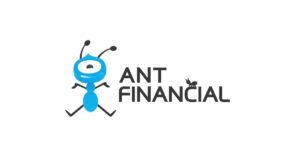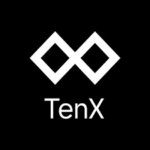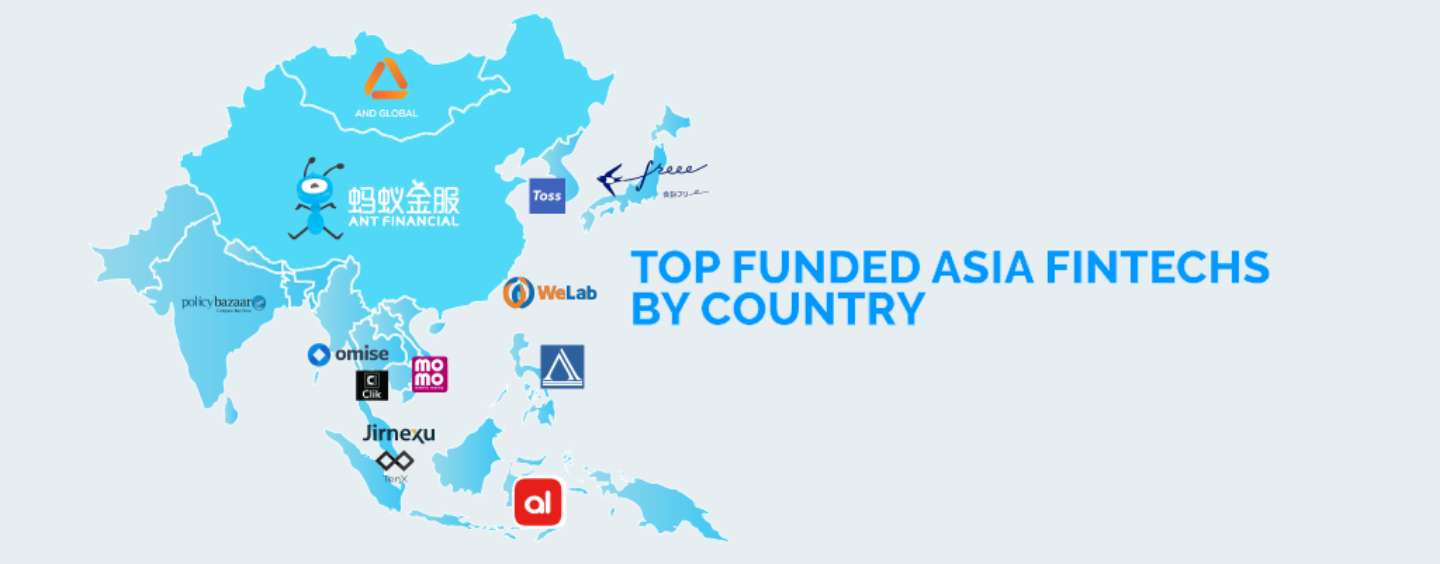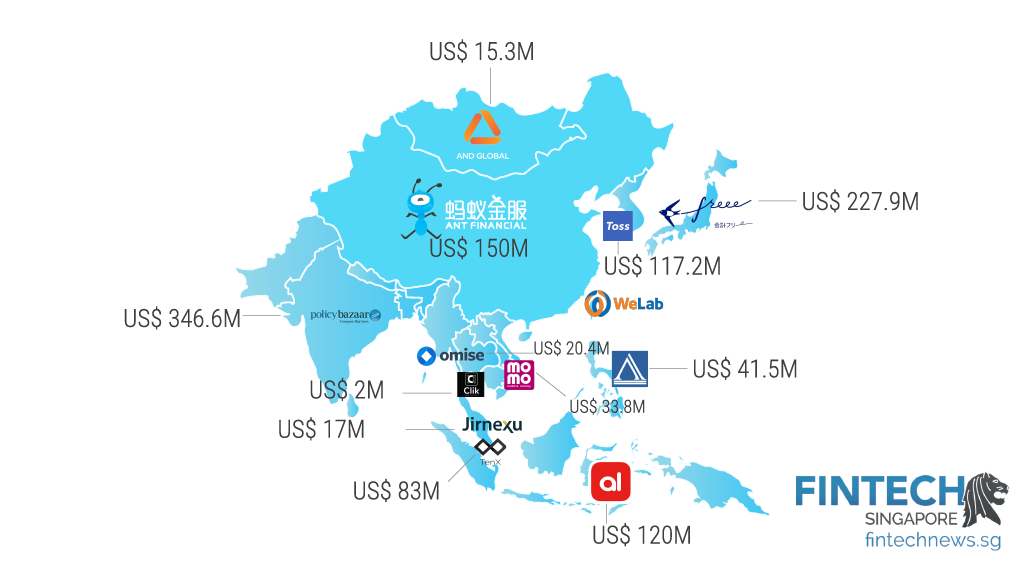With the existence of such a huge region with huge swaths of unbanked and uninsured populations, investors are waking up to the potential that Asia has in fintech. According to Bain & Company, 2017 saw a sharp spike of recorded venture capital deals which quadrupled from its 2012 amount.
Between now and 2019, over 60% of investors from Southeast Asia state technology will be their main focus, with fintech, in particular, being the largest sub-sector. And many regions have begun producing their own giants.
This list of top-funded fintech companies were compiled based on disclosed values on Crunchbase (unless otherwise stated) and it should be noted that it may not reflect the company’s actual valuations, which may come private investors and etc. So without further ado, the top funded fintech companies in different Asian regions are:
China – Ant Financial (US$150 billion)

Of the China e-wallets Alipay is one of the premier names that have helped the nation shift towards a cashless society, in parts thanks to its e-commerce origins. Ant Financial is the fintech arm of the Alibaba Group, and widely considered one of the most valuable fintech companies in the world. Its recent round of funding was raised so that Ant Financial could tackle the global market. One of its most recent developments is a dabble into blockchain technology, to allow AlipayHK and GCash to launch cross-border remittance for a lower cost between Hong Kong and Philippines.
Indonesia – Akulaku (US$120 million)

Akulaku is a consumer financing company based in Indonesia, and now operates in the Phillippines, Malaysia, Vietnam and Indonesia. It focuses on providing the underserved with financial services, including online installments for purchases.
The company does so by offering virtual credit card services to Malaysians who may not own a credit card with a bank. They have since expanded into e-commerce, as well as consumer financing for online purchases.
Hong Kong – WeLab (US$425 million)

WeLab rose to the top of Hong Kong’s highest valued companies by analysing unstructured mobile big data, and uses it to make credit decisions for individual borrowers. It is known for operating Wolaidai, a mobile lending platform in China, and WeLend, an online lending platform in Hong Kong. The company aims to make the experience seamless, and almost instataneous.
The company also partners with traditional finanncial institutions by offerings its proprietary technology for corporations.
Singapore – TenX (US$83 million)

TenX, essentially, is a cryptocurrency wallet that enables users to actually spend their cryptocurrency on cash, which helps the currency achieve its intended goal of participating in the global economy instead of just another speculative market.
The wallet’s use in real-life is often bolstered by its physical Visa card launched in 2017, allowing for cryptos to be used in places that wouldn’t otherwise accept them, though the conversion model and costs are currently undisclosed.
TenX’s valuation came from a 2017 ICO that raised $83 million, and is said to be one of the bigger ones that occurred in the time-span.
Malaysia – Jirnexu (US$17 Million )

Jirnexu is primarily known from the consumers side as RinggitPlus, a comparison site for credit cards, internet connections, insurance, savings accounts and loans. Jirnexu also offers B2B (Business-to-Business) offerings for banks, like the XpressApply technology that able to automatically deal with marketing, sales, and the delivery of complex financial products for financial service institutions (FSIs).
Their most recent offering though, are chatbots that help process personal loans for RHB Bank, and could in part, reduce the manpower required to deal with customer service.
India – PolicyBazaar (US$ 346.6 million)

PolicyBazaar is one of India’s most popular insurance aggregator websites, specialising in the globally popular comparative analyses of insurance products, based on price, quality and key benefits. The company also has a financial advisory platform, PaisaBazaar, which puts it into the digital lending space as well. Its latest fundraising round, Series F, saw it raising US$200 million.
Japan – freee (US$227.9 million)

freee is automated cloud accounting software that syncs with a company’s bank accounts and automatically categorise entries to create financial reports. Freee was launched in 2013 and is offered to SMEs operating under the Japanese taxation system. It takes freemium model and its paid plan begins at 980 JPY (~10 USD) per month per business. Since then, freee has expanded into HR cloud-based softwares as well, and claims tohave over one million business accounts.
South Korea – Viva Republica (US$117.2 million)

Viva Republica, through its mobile app Toss, provides a P2P mobile payments platform in Korea. Instead of the usual mobile banking involving OTP devices and multiple passwords, Toss models itself after Venmo and simplifies the process for bill-sharing, and other P2P-related transactions. Toss also partners with incumbent financial institutions, and other fintech players with services related to their financial lives, like loans, payments, investments, credit score management, spending analytics and insurance.
Phillippines – Acudeen (US$41.5 million)

Fintech startup Acudeen is pegged to have raised investments of up to US$41.6 million, with $35 million coming from its ICO, the ACU token via its Singapore entity. Acudeen is a peer-to-peer invoice marketplace that allows SMEs to convert their unclaimed receivables into cash to help with runway. Now, the company runs a blockchain-powered marketplace.
Cambodia – Clik (US$2 million)

Clik is a payment gateway and aggregator that aims to provide a safe, seamless and simple payment experience to everyone. Their partners include established Cambodian retailers, such as uCARE Pharma, Hard Rock Cafe Phnom Penh and MEAS Group.
Clik is also an e-wallet, that allows foor payments via International Payment Scheme cards, P2P transactions, and even paying merchants.
Thailand – Omise (US$20.4 million)

Omise is an online payment API in Thailand allows merchants to accept online payments without requiring cumbersome documentation to apply, monthly commitments, and without the usual high transaction fees. Omise aims to help increase conversion by ensuring that their payments platform is seamless during checkouts.
Mongolia – AND Global (US$15.3 million)

AND Global was founded in Mongolia, but incorporated in Singapore as of May 2015. This company, via LendMN, specialises in lending, with services like microlending, installment loans, and a digital wallet. The company utilises AI credit scoring to determine the credit-worthiness of applicants, which should also reduce the costs of on-boarding, underwriting, and risk. The company is now attempting to expand beyond its Mongolian borders. Its valuation was based on this article by DealStreetAsia.
Vietnam – Momo ($33.8 million)

Momo is a startup that offers a mobile, electronic wallet and payment application for iOS and Android devices. Its products help customers in Vietnam make nationwide cash transfers, pay more than 100 types of bills, recharge mobile phone accounts, settle personal loans, and purchase services such as software license and online game cards, airline and movie tickets, etc. The company’s payment system partners with 24 domestic banks and foreign payment networks, including JCB, MasterCard, and Visa.
Editors note: Certain countries were not mentioned because we were not able to accurately determine the top funded startup, due to lack of information. We also did not include companies such as Grab or Go-Jek in the list because they offer a variety of services outside of the realm of fintech, and it is difficult to ascertain the percentage of funds that go into their fintech endeavours.
Other resources you might be interested in
Check out our resource page to find out what are the top funded fintechs in countries like — Singapore, Malaysia, Indonesia, Philippines, India, China, Hong Kong, Taiwan, Korea and Japan










